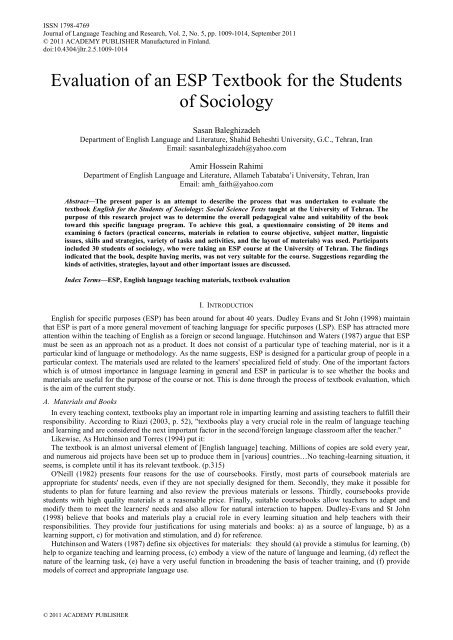Journal of Language Teaching and Research Contents - Academy ...
Journal of Language Teaching and Research Contents - Academy ...
Journal of Language Teaching and Research Contents - Academy ...
Create successful ePaper yourself
Turn your PDF publications into a flip-book with our unique Google optimized e-Paper software.
ISSN 1798-4769<br />
<strong>Journal</strong> <strong>of</strong> <strong>Language</strong> <strong>Teaching</strong> <strong>and</strong> <strong>Research</strong>, Vol. 2, No. 5, pp. 1009-1014, September 2011<br />
© 2011 ACADEMY PUBLISHER Manufactured in Finl<strong>and</strong>.<br />
doi:10.4304/jltr.2.5.1009-1014<br />
Evaluation <strong>of</strong> an ESP Textbook for the Students<br />
<strong>of</strong> Sociology<br />
Sasan Baleghizadeh<br />
Department <strong>of</strong> English <strong>Language</strong> <strong>and</strong> Literature, Shahid Beheshti University, G.C., Tehran, Iran<br />
Email: sasanbaleghizadeh@yahoo.com<br />
Amir Hossein Rahimi<br />
Department <strong>of</strong> English <strong>Language</strong> <strong>and</strong> Literature, Allameh Tabataba’i University, Tehran, Iran<br />
Email: amh_faith@yahoo.com<br />
Abstract—The present paper is an attempt to describe the process that was undertaken to evaluate the<br />
textbook English for the Students <strong>of</strong> Sociology: Social Science Texts taught at the University <strong>of</strong> Tehran. The<br />
purpose <strong>of</strong> this research project was to determine the overall pedagogical value <strong>and</strong> suitability <strong>of</strong> the book<br />
toward this specific language program. To achieve this goal, a questionnaire consisting <strong>of</strong> 20 items <strong>and</strong><br />
examining 6 factors (practical concerns, materials in relation to course objective, subject matter, linguistic<br />
issues, skills <strong>and</strong> strategies, variety <strong>of</strong> tasks <strong>and</strong> activities, <strong>and</strong> the layout <strong>of</strong> materials) was used. Participants<br />
included 30 students <strong>of</strong> sociology, who were taking an ESP course at the University <strong>of</strong> Tehran. The findings<br />
indicated that the book, despite having merits, was not very suitable for the course. Suggestions regarding the<br />
kinds <strong>of</strong> activities, strategies, layout <strong>and</strong> other important issues are discussed.<br />
Index Terms—ESP, English language teaching materials, textbook evaluation<br />
© 2011 ACADEMY PUBLISHER<br />
I. INTRODUCTION<br />
English for specific purposes (ESP) has been around for about 40 years. Dudley Evans <strong>and</strong> St John (1998) maintain<br />
that ESP is part <strong>of</strong> a more general movement <strong>of</strong> teaching language for specific purposes (LSP). ESP has attracted more<br />
attention within the teaching <strong>of</strong> English as a foreign or second language. Hutchinson <strong>and</strong> Waters (1987) argue that ESP<br />
must be seen as an approach not as a product. It does not consist <strong>of</strong> a particular type <strong>of</strong> teaching material, nor is it a<br />
particular kind <strong>of</strong> language or methodology. As the name suggests, ESP is designed for a particular group <strong>of</strong> people in a<br />
particular context. The materials used are related to the learners' specialized field <strong>of</strong> study. One <strong>of</strong> the important factors<br />
which is <strong>of</strong> utmost importance in language learning in general <strong>and</strong> ESP in particular is to see whether the books <strong>and</strong><br />
materials are useful for the purpose <strong>of</strong> the course or not. This is done through the process <strong>of</strong> textbook evaluation, which<br />
is the aim <strong>of</strong> the current study.<br />
A. Materials <strong>and</strong> Books<br />
In every teaching context, textbooks play an important role in imparting learning <strong>and</strong> assisting teachers to fulfill their<br />
responsibility. According to Riazi (2003, p. 52), "textbooks play a very crucial role in the realm <strong>of</strong> language teaching<br />
<strong>and</strong> learning <strong>and</strong> are considered the next important factor in the second/foreign language classroom after the teacher."<br />
Likewise, As Hutchinson <strong>and</strong> Torres (1994) put it:<br />
The textbook is an almost universal element <strong>of</strong> [English language] teaching. Millions <strong>of</strong> copies are sold every year,<br />
<strong>and</strong> numerous aid projects have been set up to produce them in [various] countries…No teaching-learning situation, it<br />
seems, is complete until it has its relevant textbook. (p.315)<br />
O'Neill (1982) presents four reasons for the use <strong>of</strong> coursebooks. Firstly, most parts <strong>of</strong> coursebook materials are<br />
appropriate for students' needs, even if they are not specially designed for them. Secondly, they make it possible for<br />
students to plan for future learning <strong>and</strong> also review the previous materials or lessons. Thirdly, coursebooks provide<br />
students with high quality materials at a reasonable price. Finally, suitable coursebooks allow teachers to adapt <strong>and</strong><br />
modify them to meet the learners' needs <strong>and</strong> also allow for natural interaction to happen. Dudley-Evans <strong>and</strong> St John<br />
(1998) believe that books <strong>and</strong> materials play a crucial role in every learning situation <strong>and</strong> help teachers with their<br />
responsibilities. They provide four justifications for using materials <strong>and</strong> books: a) as a source <strong>of</strong> language, b) as a<br />
learning support, c) for motivation <strong>and</strong> stimulation, <strong>and</strong> d) for reference.<br />
Hutchinson <strong>and</strong> Waters (1987) define six objectives for materials: they should (a) provide a stimulus for learning, (b)<br />
help to organize teaching <strong>and</strong> learning process, (c) embody a view <strong>of</strong> the nature <strong>of</strong> language <strong>and</strong> learning, (d) reflect the<br />
nature <strong>of</strong> the learning task, (e) have a very useful function in broadening the basis <strong>of</strong> teacher training, <strong>and</strong> (f) provide<br />
models <strong>of</strong> correct <strong>and</strong> appropriate language use.

















